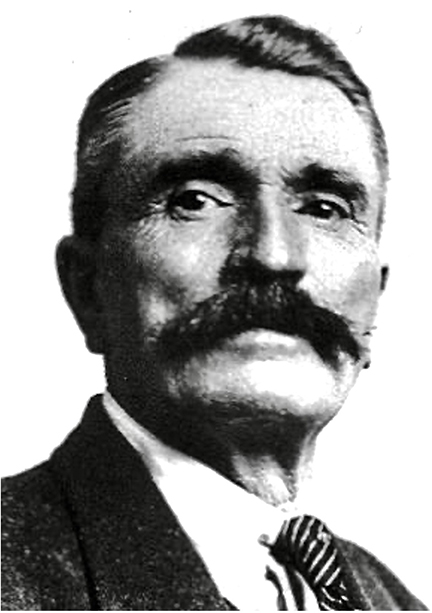Charles Joseph Ross
‘Biltong’ Ross was a larger-than-life Kenyan character. Born in Australia on 4 July 1857, he joined the Australian Mounted Police, rounding up gangs of bushrangers. As a young man he travelled to America where he lived with native Americans and became a scout for the United States army in three of their Indian wars. He then joined the Canadian NW Mounted Police for six years and was Chief Scout during the Riel rebellion. He drifted southwards to Utah and tried his hand unsuccessfully as a gold miner. When the South African war broke out at the end of the 19th century, he joined the Canadian Mounted Rifles and went there to fight. His fine work attracted the attention of Lord Kitchener, who allowed Ross to raise and command a troop of irregular cavalry with the name ‘The Canadian Scouts’. At the Boer War’s end he went with the Boer Mounted Infantry to British Somaliland, to fight the ’Mad Mullah’.
He decided to settle in Tanganyika, then ruled by the Germans as German East Africa. He bought some land and started poaching elephants in both British and German East Africa. The German authorities seized his land in retaliation for this illegal activity, so he moved to the Kisii region of British East Africa, continuing to poach and sell his ivory just across the German border to an Asian trader in Shirati. He was so angry about the seizure of his Tanganyika land that he would sometimes raid across the border and seize herds of native cattle, thus further infuriating the German authorities. They must have communicated with the authorities in British East Africa because in order to curtail these exploits Ross was appointed an Assistant Game Ranger in 1907, to try and make him become respectable. The strategy worked and Ross was appointed a guide for Theodore Roosevelt’s safari in 1909.
A year later he guided another safari, this time for Buffalo Jones, a famous American wildlife conservator who preferred photography to animal slaughter. Shortly thereafter the First World War broke out and because Charles Ross possessed extensive knowledge of the bush on both sides of the border, he was potentially very useful to the British East African military authorities now fighting the Germans in Tanganyika. He was directed to form his own unit of scouts; in November 1914 the 40 men of Ross’s Scouts were sent to secure the western end of the British and German East African border areas.
This was an opportunity for Ross to settle old scores. On 28 November 1914 he and his men rode into Shirati to find the Germans gone, but had to ride quickly out again when a British steamer shelled the town. Then it was decided to disband Ross’s Scouts and his 40 men chose where next to go. Some went on intelligence duties and some, under Lieutenant JJ Drought, stayed in the eastern lake area, raising a force of tribesmen for cross-border patrolling. This was known as the ‘Skin Corps’ because of the tribesmen’s aversion to using clothing. After the war Ross rejoined the British East Africa Game Department, working from his home in Eldama Ravine. On 19 June 1922, just 15 days short of his 65th birthday, he died of double pneumonia caused by exposure after a fall whilst out on patrol. He had had two wives and eight children.
Ross was an unpleasant man with an ungovernable temper. When his son Charles William was had up in front of a jury for the murder of two white women, his mother entered the witness box to describe the full horror of her life with her husband, in order to convince the jury that the son of such a father could not be normal. Her life had been a torture as she had suffered her spouse’s brutal lashings and threats to shoot her. Once in a rage he had seized her baby and threatened to throw it in the fire. Her pleas to the jury were ineffective and Charles William was hanged. Two men who served under Ross in the South African war remembered his savagery. He shot prisoners without mercy.


Recent Comments